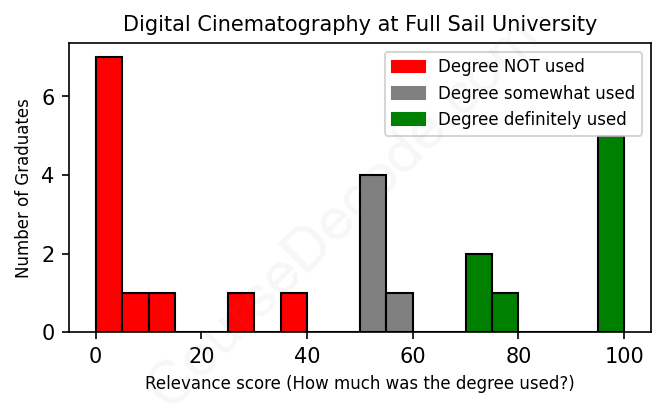
First, some facts. Of the Digital Cinematography graduates from Full Sail University we've analyzed , here's how many have used (or NOT used) their degree in their career:

These are estimates based on AI analysis of 24 LinkedIn profiles (see below).
The verdict? Bad. Overall, with an average relevance score of 44%, Digital Cinematography graduates from Full Sail University have a substantially lower likelihood (-23%) of finding work in this field compared to the average graduate across all fields:
And for comparison, here's the chart for all profiles we've looked at across all degrees.
Also, after graduating, only 25% of these graduates have pursued further education other than another Bachelor's degree (such as a Masters degree or other), compared to the average across all profiles of 35%. This suggests a Bachelors degree is enough for most Digital Cinematography graduates, and it's normal to look for work straight after graduation.
See the details:
|
Relevance score: 78% We think this person has gone into a career highly relevant to their degree. We think this person has gone into a career highly relevant to their degree.
DEGREE INFOGraduated in 2017 from Full Sail University with a Bachelor's degree in Digital Cinematography. No other secondary education since. JOB HISTORY SINCE GRADUATIONProduction Manager Stuvland Films Feb 2017 - May 2017 Production Assistant  HotbitVR May 2017 - May 2017 Director Of Photography  Freelance Video Professional May 2017 - May 2017 Director Of Photography  Freelance Cinematographer Los Angeles Feb 2017 - Present Chief Executive Officer  The Wandering Kiltsman LLC Mar 2019 - Present ABOUTA motivated film maker who can wear many hats, in more locations, with military discipline, and approachable personality. Dependable. Professional. Flexible. |
The top 10 most common jobs done by the graduates we've analyzed (ranked most common to least) are:
When looking at the jobs people from Full Sail University's Digital Cinematography program have landed, a few trends pop up. Many nearby roles, like “Director of Photography” and positions focused on “Video Editing” or “Photography,” are clearly linked to cinematography skills. These types of jobs allow graduates to really use what they've learned about visual storytelling, camera techniques, and editing. However, there’s a significant number of roles that veer off from the core focus of digital cinematography, such as management positions, sales roles, or even jobs in unrelated fields like education and healthcare. While some of these positions may require soft skills like communication or creativity, they don’t tap into the technical skills that a Digital Cinematography degree emphasizes.
Overall, while there are certainly some graduates who have found fulfilling careers directly related to their studies, many have drifted into jobs that are only loosely related to their degree. It’s a mixed bag; you’ve got those who are hitting the mark by working in cinematography and film production, while others are applying their talents and skills in more diverse areas that don’t necessarily leverage their cinematic training. This shows that while a Digital Cinematography degree can pave the way to some exciting opportunities in the film and media world, it doesn't guarantee that every graduate will land a cinematography-centered job right off the bat. It's all about how they choose to apply their skills in the real world.”
Here is a visual representation of the most common words in job titles for Digital Cinematography graduates (this is across all Digital Cinematography graduates we've analyzed, not just those who went to Full Sail University):

So, looking at the career paths of graduates from Full Sail University who studied Digital Cinematography, it seems like there's a mixed bag of outcomes. Many of these folks land their first jobs in the industry fairly quickly after graduating, usually within a couple of years. Some kickstart their careers as production assistants, photographers, or video editors, which align well with their degrees. For example, we see a bunch of graduates taking on roles in video production or photography, which makes sense given their background. However, there are also quite a few who end up straying from the cinematic path into seemingly unrelated fields, like sales or tech support, which isn’t exactly what you'd expect from a specialized program in cinematography.
As time goes on, about five to ten years after graduation, a good number of graduates manage to carve out careers in relevant roles, such as cinematographers, production managers, or creative directors. It's encouraging to see some building their own companies or freelance careers in filmmaking, which shows ambition and a commitment to their craft. However, there are also many who seem to have settled into jobs that don’t leverage their skills in digital cinematography at all. This divergence suggests that while some alumni thrive within the expected industry niches, others might find stable but less relevant career paths, indicating that the journey can vary quite a bit. Overall, the outcomes for Digital Cinematography grads from Full Sail are definitely mixed—many are doing great things, but some aren’t quite on that cinematic track, which is worth considering if you’re thinking about this field for your future.
Honestly, pursuing a Bachelor’s degree in Digital Cinematography, especially at a school like Full Sail University, can be pretty intense. The program is designed to be hands-on, so you’ll be diving deep into everything from camera work to lighting and editing, which can be a bit overwhelming, but also super rewarding if you’re passionate about filmmaking. While some might find it easier than traditional degrees that focus more on theory, the practical nature means you’ll be cranking out projects and learning a ton on the fly. So, if you’re ready to put in the effort and stay committed, it can be an awesome ride, but it won’t be a walk in the park!
Most commonly, in the LinkedIn profiles we've looked at, it takes people 3 years to finish a Bachelor degree in Digital Cinematography.
Looking at the career paths of these Full Sail University graduates, it seems they’re experiencing a mix of financial success, but overall, it doesn't scream "big bucks." Many of them have moved through various roles, like digital product ownership and event management, which might bring in decent salaries, especially at companies like Apple. However, others are freelance photographers or have jobs that don’t seem to pay that well, like a mail handler or a customer service rep, which could put a damper on their earnings. While some are clearly climbing the ladder, especially those in management roles or owning their own companies, it looks like many might still be finding their financial footing in the industry, working their way up and hoping for those bigger salaries down the line. So, it’s a bit of a mixed bag when it comes to making decent money right off the bat!
Here is a visual representation of the most common words seen in the "about" section of LinkedIn profiles who have a Bachelor degree in Digital Cinematography (this is across all Digital Cinematography graduates we've analyzed, not just those who went to Full Sail University). This may or may not be useful:

Here are all colleges offering a Bachelor degree in Digital Cinematography (ordered by the average relevance score of their Digital Cinematography graduates, best to worst) where we have analyzed at least 10 of their graduates:
| College | Score | Count |
|---|---|---|
 Full Sail University Full Sail University
|
44 | 24 |